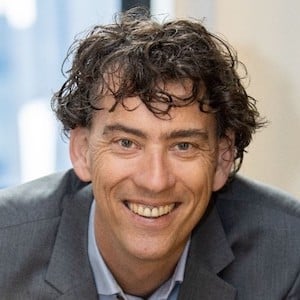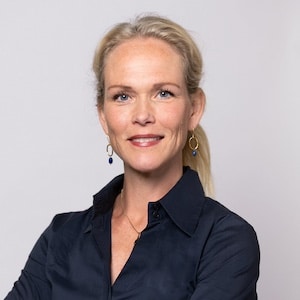Marco Smit: ‘Not a cure-all, but a Swiss army knife’
The Metropolis of Tomorrow requires bold choices and breakthroughs. The 'Look differently, act differently' movement offers a new perspective arguing for a fundamentally different approach and way of collaborating, based on inclusive prosperity. A great idea, says Horizon Flevoland director Marco Smit, but perhaps the angle is still a bit too wide. "We can't solve everything."
“Invest in Flevoland,” is the slogan of Horizon Flevoland. The regional development agency invests in Flevoland companies, drives innovation and gives advice to SMEs, for example on their international ambitions. The organisation is a good fit with Marco Smit’s resume, as he worked on Dutch international trade relations in Boston and Dubai, among other places, for the Netherlands Foreign Investment Agency. These were different times: from Boston, he tried to bring as many companies to Amsterdam as possible. “That’s not possible now. There are no employees and square footage is scarce.”
Marco, you have read the draft text that marked the start of the ‘Look differently, act differently’ movement. What was your first impression?
“I was actually reading a strategic vision paper and ultimately every region needs that. After all, you want to know what you’re all working on together, you need a horizon. We live in a period of great transitions. There is scarcity everywhere and that scarcity is guiding our actions now. The power grid cannot handle all the available energy, there is a lack of space and that also affects our approach. So a vision is needed. A vision which now focuses not so much on growth, but on making impact is – to quote Prince – a sign of the times. There is economic growth and abundance, almost everyone has a job. We can afford to focus more on impact. The Economic Board Flevoland, of which I am a member, is doing that. As does Horizon Flevoland.”

Marco Smit
What does ‘making an impact’ mean to you?
“We help companies innovate and internationalise and we invest in companies. What we’re looking for when investing has now changed. We used to look at euros and employment opportunities. Now we take in consideration the impact a company can make in the energy, food or raw material transition. This makes it much more challenging. It used to be very easy to say, we’ll put this company here, or we’ll invest in this company and that will create this amount of jobs. But making impact is abstract, because a lot of different companies are needed for those transitions. It is difficult to determine the exact added value, the impact, of a company. It’s also harder for Economic Boards to show their added value. After all, what have you contributed to ‘no more hunger,’ one of the United Nations’ Sustainable Development Goals (SDGs)?”
What does this shift mean for you specifically? What businesses would Horizon Flevoland now be reluctant to invest in?
“We no longer invest our own euros in the oil and gas industry. Although of course there is a gray area there too. A company that develops lightweight composite materials may end up supplying them to that industry. You have to remain agile in these kinds of considerations. Everything is constantly changing. In the past, we wouldn’t be so quick to invest in the defense industry either, but the war in Ukraine has completely tilted our vision on having our own defense industry.”
So no more money towards Shell.
“Not directly from us, but ultimately we still desperately need a company like Shell for the energy transition. There is an infinite amount of knowledge, experience and technological infrastructure there and we need it to make a rapid jump in scale. Nor can we afford to focus only on solar, only on wind or only on nuclear. Innovation is key. Innovation is needed for solutions to problems that already exist and for problems we don’t yet know about. Product innovation comes primarily from regional SMEs, not from large companies. I see it as one of our tasks to connect regional and innovative SMEs with those large companies.”
What will it take to move those innovations forward?
“A healthy ecosystem is the first important condition. The startups and scale-ups working on those innovations face enormous risks. The regional development agences (ROMs) and Economic Boards in our country can link those companies to education, to governments, to other companies. So often I see beautiful collaborations develop at meetings we organise between partners from different sectors. An entrepreneur meeting up with an academic, or an investor. Because venture capital is part of that healthy ecosystem. Innovative companies usually cannot make the leap on their own. And the ROMs are by far the most active early-stage venture capital investors in the Netherlands.”
Fair pricing and new revenue models are also mentioned in the ‘Look differently, act dfferently’ call. Is that issue also addressed by the companies you invest in?
“Fair, of course, is a very complicated word. Companies depend largely on world commodity prices. The food transition requires us to consume more plant-based protein, but a liter of milk from field beans is currently a lot more expensive than a liter of milk from animal dairy. That may be unfair to the consumer, but we also would like the field bean farmer to get a fair price for their crop. I regularly speak to business owners who want to be part of certain transitions, but get a more expensive production process. I think the government should start paying for this. That can provide price moderation.
In this context, it is also important to organise chains differently. This is also where the Economic Boards can play an important role. They can bring entire chains to the table. There are unnecessary steps in many production chains, which cause unnecessary price increases. At the Urban agriculture project in the new, self-sufficient neighborhood of Oosterweld in Almere, residents explore how to pay a fair price for local food by organising the chain in the best way possible.”
You mentioned earlier the cooperation between business, government and education: the triple helix. Amsterdam Economic Board talks about the quadruple helix: civil society organisations must also play a role in the Metropolis of Tomorrow in which inclusive prosperity is the starting point. How do you feel about that?
“At the Economic Board Flevoland, we also discuss inclusive prosperity. That is an important theme, but not one that we can take on in its entirety. We are not a social institution. That’s simply not our role and we don’t have enough manpower for this. We need to focus. As far as I am concerned, we focus on the economic part of inclusive prosperity. We leave the social part to other organisations. Here in Flevoland, for example, we have ‘werkvoorzieningschappen’, an organisation which offers paid employment to people at a distance to the job market. They are of course part of our ecosystem, but their work is not ours. Moreover: when we focus on innovative companies now, we’ll focus on future earning power which can finance inclusive prosperity. As an Economic Board –as well as the ROMs – you should not want to be a cure-all, but a Swiss army knife.”
14 August 2023
Read more about
Contact us
Want to keep up to date?
Get the best regional news and events (in Dutch) via the Board Update newsletter
Share this news
Want to keep informed?
Follow us daily on LinkedIn and sign up for the Board Update newsletter.
Read more
- Adyen is one of the great success stories of Amsterdam’s tech ...
- Together with enthusiastic partners in three coalitions, the Amsterdam Economic Board is ...
- The top 100 AI tools based in the Amsterdam Metropolitan Area are shown ...


